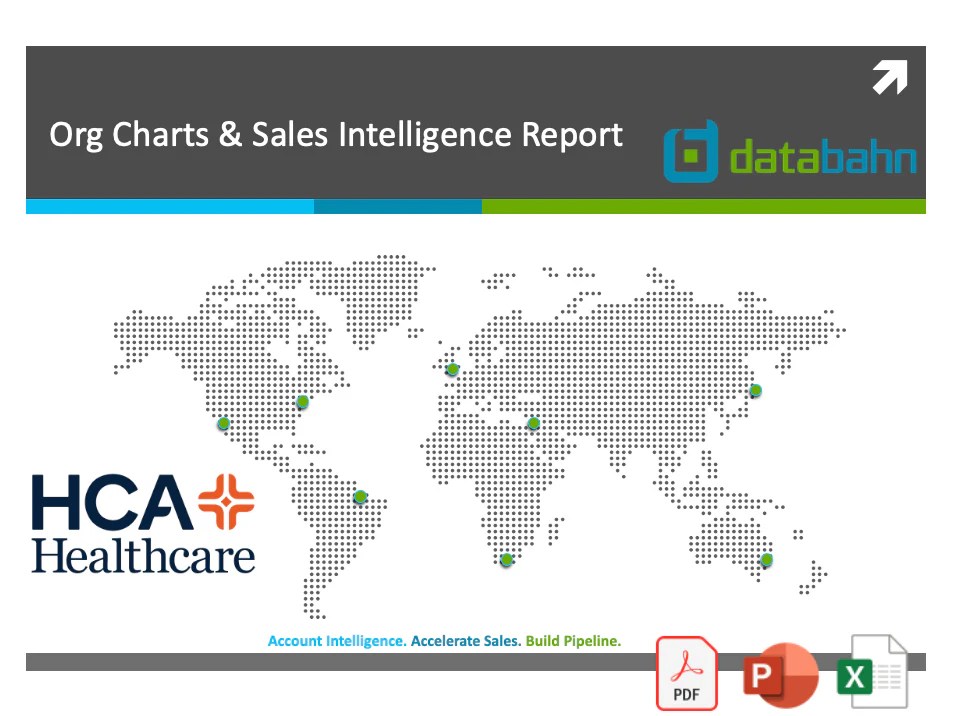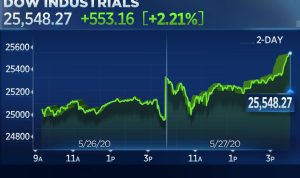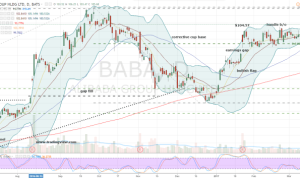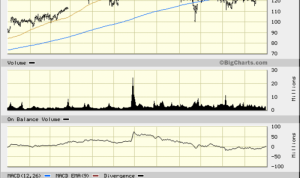HCA Healthcare Stock Price Analysis
Hca healthcare stock price – HCA Healthcare, a leading healthcare provider in the United States, has experienced significant fluctuations in its stock price over the past few years. Understanding the historical trends, influencing factors, financial performance, and analyst predictions is crucial for investors seeking to assess the potential risks and rewards associated with investing in HCA Healthcare stock.
HCA Healthcare Stock Price History and Trends

Source: zenfs.com
A line graph illustrating HCA Healthcare’s stock price over the past five years would reveal a generally upward trend, punctuated by periods of volatility. Key price points would include significant highs and lows, correlated with specific events such as major acquisitions, changes in healthcare regulations, or broader economic shifts. For example, a noticeable dip might be observed during the initial stages of the COVID-19 pandemic, followed by a recovery as the healthcare system adapted.
Conversely, periods of strong financial performance and positive investor sentiment would likely be reflected in significant price increases.
Major upward trends can often be attributed to factors like increased patient volumes, successful cost-cutting measures, and expansion into new markets. Conversely, downward trends may be linked to regulatory changes, increased competition, or macroeconomic headwinds. Comparing HCA Healthcare’s performance to its main competitors (e.g., Tenet Healthcare, Universal Health Services) over the same period would reveal relative strengths and weaknesses.
A four-column responsive table would clearly present this comparison, showing stock price changes, key performance indicators, and market capitalization for each company.
| Company | Stock Price Change (5-year) | Key Performance Indicators | Market Capitalization |
|---|---|---|---|
| HCA Healthcare | [Insert Percentage Change] | [Insert Key Metrics e.g., Revenue Growth, Profit Margin] | [Insert Market Cap] |
| Tenet Healthcare | [Insert Percentage Change] | [Insert Key Metrics e.g., Revenue Growth, Profit Margin] | [Insert Market Cap] |
| Universal Health Services | [Insert Percentage Change] | [Insert Key Metrics e.g., Revenue Growth, Profit Margin] | [Insert Market Cap] |
Factors Influencing HCA Healthcare Stock Price
Three significant internal factors influencing HCA Healthcare’s stock price include operational efficiency, revenue growth, and strategic acquisitions. Operational efficiency improvements, such as streamlining processes and reducing administrative costs, directly impact profitability and investor confidence. Consistent revenue growth, driven by increased patient volumes or higher service prices, is another key driver. Strategic acquisitions of hospitals or healthcare facilities can expand market share and create long-term value, but also carry inherent risks.
Externally, factors such as changes in healthcare regulations, the overall economic climate, and the competitive landscape significantly impact HCA Healthcare’s stock price. Government regulations regarding reimbursement rates and healthcare spending directly affect the company’s profitability. Economic downturns can lead to reduced consumer spending on healthcare services, impacting revenue. Increased competition from other healthcare providers can put pressure on pricing and market share.
Healthcare industry regulations have a profound impact on HCA Healthcare’s stock price. Changes in reimbursement policies, for instance, can alter the company’s revenue stream and profitability. Regulations related to patient privacy and data security also influence investor confidence and operational costs.
Financial Performance and Stock Valuation
HCA Healthcare’s key financial metrics over the past three years can be presented in a four-column responsive table, including revenue, net income, total debt, and earnings per share (EPS). This data provides a clear picture of the company’s financial health and growth trajectory. Comparing HCA Healthcare’s Price-to-Earnings (P/E) ratio to its industry average and historical average offers insights into its valuation relative to its peers and its own past performance.
A higher-than-average P/E ratio might suggest that the market anticipates strong future growth.
| Year | Revenue (USD Billions) | Net Income (USD Billions) | Debt (USD Billions) |
|---|---|---|---|
| [Year 1] | [Insert Data] | [Insert Data] | [Insert Data] |
| [Year 2] | [Insert Data] | [Insert Data] | [Insert Data] |
| [Year 3] | [Insert Data] | [Insert Data] | [Insert Data] |
HCA Healthcare’s dividend policy, including its dividend payout ratio and dividend growth rate, significantly impacts investor sentiment. Consistent dividend payments can attract income-seeking investors, while increases in dividend payouts signal confidence in future profitability.
Analyst Ratings and Predictions

Source: databahn.com
A summary of the consensus rating from major financial analysts for HCA Healthcare stock would typically include the average rating (e.g., Buy, Hold, Sell) and the percentage of analysts holding each rating. This information provides a snapshot of the overall market sentiment towards the stock.
- Analyst A: Buy rating, Price Target: $[Price]
- Analyst B: Hold rating, Price Target: $[Price]
- Analyst C: Sell rating, Price Target: $[Price]
Analysts’ price targets often vary, reflecting different assumptions about future growth and risk. A range of price targets, from the most optimistic to the most pessimistic, provides a better understanding of the potential price movements.
A four-column table summarizing the key arguments of analysts with bullish versus bearish outlooks would highlight the different perspectives shaping the investment narrative. Bullish analysts might focus on strong revenue growth, while bearish analysts may highlight potential regulatory risks.
| Analyst Outlook | Key Argument 1 | Key Argument 2 | Key Argument 3 |
|---|---|---|---|
| Bullish | Strong Revenue Growth | Efficient Operations | Strategic Acquisitions |
| Bearish | Regulatory Uncertainty | Increased Competition | Economic Slowdown |
Risk Factors and Potential Challenges
Key risks and challenges facing HCA Healthcare include increasing healthcare costs, regulatory changes, and competition. Rising labor costs and the cost of medical supplies can squeeze profit margins. Changes in healthcare reimbursement policies can significantly impact revenue. Competition from other healthcare providers, including both for-profit and non-profit organizations, can put pressure on pricing and market share.
HCA Healthcare’s stock price performance often reflects broader market trends in the healthcare sector. However, comparing its trajectory to other players provides valuable context. For instance, understanding the current performance of syk stock price can offer a benchmark against which to analyze HCA’s relative strength. Ultimately, HCA’s stock price remains influenced by its own operational efficiency and financial results.
Changes in healthcare reimbursement policies can significantly impact HCA Healthcare’s profitability and stock price. Reductions in reimbursement rates or changes in payment models could lead to lower revenue and reduced profitability.
HCA Healthcare employs various strategies to mitigate these risks, such as cost-containment initiatives, strategic partnerships, and diversification of services. These strategies aim to improve operational efficiency, secure new revenue streams, and enhance its competitive position.
Investor Sentiment and Market Outlook

Source: seekingalpha.com
Current investor sentiment towards HCA Healthcare is generally [Insert Sentiment – e.g., positive, neutral, negative], reflecting recent performance and future expectations. This sentiment is influenced by factors such as recent earnings reports, analyst ratings, and broader market trends. Broader market conditions, including interest rates, inflation, and economic growth, can impact investor risk appetite and affect the valuation of healthcare stocks like HCA Healthcare.
A strong economy typically leads to higher stock prices, while economic downturns can trigger sell-offs.
Macroeconomic factors, such as inflation and interest rates, can affect HCA Healthcare’s future performance. High inflation can increase operating costs, while rising interest rates can increase borrowing costs and reduce investment in capital projects. Understanding these macroeconomic trends is crucial for assessing the long-term outlook for HCA Healthcare’s stock price.
User Queries
What is HCA Healthcare’s dividend yield?
HCA Healthcare’s dividend yield fluctuates; refer to current financial reports for the most up-to-date information.
How does HCA Healthcare compare to its competitors in terms of market capitalization?
HCA Healthcare’s market capitalization is substantial within the healthcare sector; a comparison to competitors requires referencing current market data.
What are the main risks associated with investing in HCA Healthcare stock?
Key risks include changes in healthcare policy, economic downturns impacting patient volumes, and increased competition.
Where can I find real-time HCA Healthcare stock price quotes?
Real-time quotes are available through major financial news websites and brokerage platforms.






